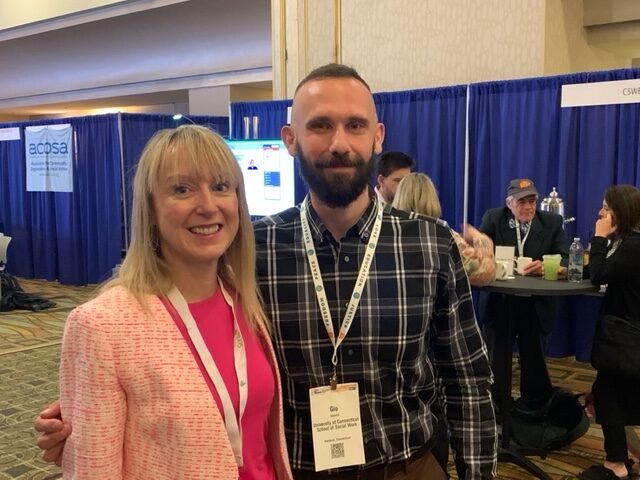The Social Work Speaks Out project is helping social work schools create more positive learning environments for LGBTQ+ students
Posted on January 30, 2023
Categories:Awards & Recognition,Faculty,Research,Shelley Craig
Over the course of her career, Shelley Craig — a leading researcher on the resilience of LGBTQ+ youth — has designed and tested interventions to improve the wellbeing of sexual and gender minorities, who are known to confront discrimination in their daily lives. But when it came to LGBTQ+ students in North American social work programs, she and her colleagues knew less about their experiences and needs.
To learn more, Craig and her collaborators developed a large-scale study. The results of this research are now helping create a more positive learning environment for LGBTQ+ social work students, while also increasing competence in all social work graduates.
In the ‘Social Work Speaks Out’ project, Craig and her collaborators surveyed more than 1,000 LGBTQ+ students in 126 social work programs across 44 states and seven provinces. Overall, one-third of the respondents who participated in the online survey said they encountered homophobia in their programs. A segment of the respondents also took part in online interviews and focus groups. Before this project, there were only small, qualitative studies on sexual and gender minority students in social work education.
“It was shocking to hear some of the students’ negative stories, especially since they happened in programs that are supposed to be preparing professionals to support all types of marginalized groups,” says Craig, the Canada Research Chair in Sexual and Gender Minority Youth and a professor in U of T’s Factor-Inwentash Faculty of Social Work. “When I started the research, I expected that American students would report significantly worse experiences due to the more conservative social and political climate. Yet Canadian students’ experiences were similar.” In both countries, LGBTQ+ social work students were more likely to do poorly academically if their LGBTQ+ identities were not supported in the classroom and wider program.
From mistreatment of trans students to a lack of substantive LGBTQ+ content in curriculum and discussions, students cited many examples of intolerance and rejection in social work bachelor’s and master’s programs. Gio Iacono, a master’s and doctoral graduate of social work at U of T, facilitated focus groups for the study. He says that some of those stories aligned with his own experiences as an MSW student. Now an Assistant Professor of social work at the University of Connecticut, he has continued to examine practices that promote diversity and inclusion in social work education.
“One way to increase inclusion is to embed LGBTQ+ issues throughout the curriculum,” says Iacono. The ‘Social Work Speaks Out’ project found slightly more than two-thirds of respondents felt that instructors handled LGBTQ+ topics well in their classes, but only about one-third said the same of transgender topics. Drawing on data like this, Iacono and Craig explored the strategies that LGBTQ+ students use to increase their inclusion in social work programs. An article based on these findings received the 2022 award for Best Qualitative Article from The Journal of Social Work Education.
“It became clear in the focus groups that it often fell to individual students to be proactive in bringing in LGBTQ+ material into the classroom,” says Iacono. “The collective efforts to promote inclusion from the faculty and staff level often lacked coordination and consistency. This is problematic because it can leave the students doing the work feeling isolated and emotionally burdened.”
When the onus is on individual students, it can also have a dampening effect on the whole class’s learning, says Craig. “Nearly 90 per cent of survey participants felt the responsibility to educate others or serve as LGBTQ+ role models. This is essentially a double burden, because they’re already feeling the minority stress of being a member of the LGBTQ+ population and then additionally burdened with often being the one that has to explain LGBTQ+ stigma to their colleagues and instructors, and it decreases their opportunities for engaged learning in the classroom. This also affects non-LGBTQ+ students, who can’t join in open and authentic conversations, so they might lack the
confidence to engage with LGBTQ+ populations in their future practice. It really limits the effectiveness of teaching to support competent practice overall.” The ‘Social Work Speaks Out’ project has led to further research on the subject, but also to the development of best practices for affirmative social work education (which validates and advocates for the needs of sexual and gender minority students). Craig co-developed a tool to help social work educators name and effectively address microaggressions against LGBTQ+ students in their classrooms, for example, and co-authored guidelines for the Council on Social Work Education on enhancing the climate for transgender and LGBTQ+ social work students.
The U of T social work Faculty has adopted a number of the recommendations from Craig’s research, including collecting social work students’ sexual and gender identity demographic data, educating all students on program and institutional policies related to LGBTQ+ students, training faculty and staff on the delivery of competent education for LGBTQ+ students, and making physical spaces more inclusive with non-gendered bathrooms. Craig also developed an elective course on LGBTQ+ practice.
While she says many social work programs across North America still have a long way to go in supporting LGBTQ+ students, Craig is optimistic. “Our dedicated faculty has done a lot of great work, and I see other programs making progress. I have hope that things will get better.”




